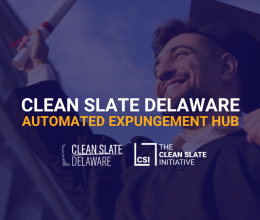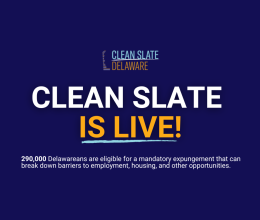This commentary, contributed by Dave Bever, Executive Director of the Delaware Center for Justice, was originally published in Delaware Online on November 20, 2023.
By: Dave Bever, Executive Director of the Delaware Center for Justice
Living with a record in Delaware means living with constant barriers to employment. Up to 400,000 people in Delaware are saddled with records that block their access to jobs, starting a business, and securing the means to participate fully in social and civic community life — and securing a second chance in the First State isn’t easy. Of the approximately 4,000 Delawareans released from incarceration each year, nearly 65% will be recommitted in the three years following their release, a disturbing fact that earns Delaware second place in the nation for recidivism.
While some returning community members lack experience or the necessary job skills for positions that pay livable wages, many more are disqualified simply because of their criminal backgrounds, thus creating a vicious cycle. Having a record can prevent you from getting a well-paying job, and low wages prevent you from being able to secure safe, stable housing, education, and other important aspects of successful reentry. With nearly 9 in 10 employers using background checks to screen applicants, people living with records are half as likely as other jobseekers to get a callback from an employer. This is especially troubling as the rate of unemployment in the reentry population is around 27%—nearly five times higher than the national unemployment rate.
Delaware’s Clean Slate law is set to begin in August 2024, and will automate the record clearance process for eligible individuals — but while people with records wait for their Clean Slate, they still need employment. It’s more important than ever for elected officials and business leaders to work together to create strong support for second chances hiring models that take crucial steps towards dismantling systemic inequalities in the criminal legal system. By advocating for the reintegration of formerly incarcerated individuals into the workforce, second chances hiring addresses the root causes of mass incarceration while fostering a healthier and safer society and rebuilding local economies.
The Reentry Council, which includes representatives from the U.S. Departments of Justice, HUD, Labor, Education, HHS, Veterans Affairs, and Agriculture, presented its report Coordination to Reduce Barriers to Reentry: Lessons Learned from COVID-19 and Beyond to Congress in April 2022. In it, the Council identified barriers to employment as a critical impediment to successful reentry. Since crime is more likely to occur when people are unable to meet their basic needs, breaking down barriers to employment is critical to combating recidivism rates and creating stronger communities for all Delawareans. Not only does stable income allow returning community members to secure housing, it also opens access to healthcare, treatment, and other community services; obtaining identification; and complying with the requirements of probation. When individuals are given opportunities to rebuild their lives through employment, it promotes a sense of belonging that strengthens families, neighborhoods, and entire communities.
With stronger local communities, comes a more prosperous state for all. Second chances hiring offers Delaware an opportunity to rebuild our local economies by allowing the hundreds of thousands of our neighbors living with records to successfully participate in the job market. Embracing second chances hiring expands the talent pool for employers, allowing them to access a broader workforce that can lead to increased innovation, productivity, and competitive advantage in the marketplace. Gainfully employed individuals are at less risk of recidivism, which reduces strain on the court system and saves taxpayers money. It also means they have more disposable income to spend, stimulating local economies, boosting demand for businesses, and creating additional jobs. This is exactly why promoting second chances hiring should be an integral part of Delaware's economic plan.
Our elected officials and business leaders are in a powerful position to make a difference in the lives of returning community members, and for all Delawareans. You can help. Ask the businesses you frequent if they hire individuals with criminal records, and if they don’t, encourage them to. Contact your state legislators and let them know you demand their support for legislation that removes barriers to second chances, such as the requirement that people pay their fines and fees in full before they apply for expungement—a near impossibility without the benefit of the kind of living wage jobs unavailable to folks with a record.
When Delaware’s Clean Slate law takes effect in August 2024, approximately 290,000 individuals—a number that represents a third of the state’s population—will be liberated from the burden of a criminal record. Many more, however, will be left waiting for their second chance. These include our friends, our family members, our coworkers, and our neighbors, all of whom want to make Delaware a better place by contributing as fully as possible to their communities.
Together, we can make the First State a second chance state.
To learn more about Delaware’s Clean Slate law, find expungement assistance, and other resources, visit Clean Slate Delaware’s automated expungement hub, CleanSlateDE.org.









